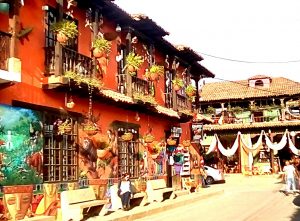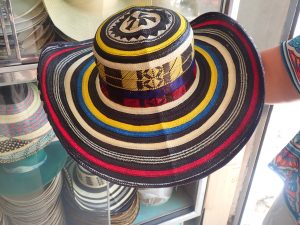
Otavalo, a village in northern Ecuador two hours from the Colombian border, hosts the largest and most famous textile market in all of South America every Saturday.
The vendor stalls spread throughout the village as thousands of locals and visitors mix it up in a dawn to dusk shopping festival. Otavelenos, the local indigenous population, has been dedicated to making and selling textiles, handicrafts, jewelry and ceramics since before the Incas arrived.
A town at 22,800 feet above sea level with two volcanoes hovering in the background, Otavalo is one of the oldest towns in Ecuador. After the Spanish conquest the local people were forced to work in sweatshops. But since independence textiles became their trade of choice earning the Otavalenos global fame and a quality of life far superior to other indigenous groups in South America. The town also boasts a solid tourist trade.





In Otavalo, 50% of the inhabitants still cling to their heritage wearing their typical clothing: hats, ponchos, embroidered shirts and blouses. Most men sport long braided pony tails, speak their own language, which is also taught in the schools, along with Spanish. Meanwhile the other half of the Otavelanos are adopting European habits wearing jeans and prefer to speak only Spanish.


The town’s biggest draw is the textile market which goes up and down the village streets and spreads over Plaza Poncho. Anything made out of wool or cotton can be found here: bags, carpets, blankets, wall hangings – woven with abstract patterns, wool caps, gloves, long sashes called fajas used to tie back their hair and jewelry made out of turquoise, lapis, pearls, silver, gold and beads and so much more. Up the hill there is an animal market which starts at sunrise till 11 a.m. Everything from cows, pigs, guinea pigs, cows, chickens and llamas are bought and sold.


You will find a lot of the crafts made in Otavalo sold in shops and stalls all over Ecuador with considerable markups. For example a good hand woven hand bag will cost between $8-$12 in Otavalo and $20 – $30 in other parts of Ecuador. The best deals and best prices are to be had at Otavalo’s Saturday market where dealing is expected. Always bargain down at least 30% of the asking price.
Otavalo is only an hour north of Quito. So one could make it a day trip from Quito or a weekend trip staying in Otavalo Friday and Saturday. it’s best to hit the market before you leave Ecuador so as not to be loaded down with merchandise and souvenirs during your trip. I only wish I’d come down in an empty van.

There are a lot of hostels and hotels in Ortavalo. I stayed at the Hotel Casona right in the center of town and right next to the market on Saturday. A nice hotel with carpet, double bed, tv., window, shower and breakfast for only $18 a night. There are a lot of restaurants ranging in price from $2-$10 a meal. And there are a lot of food stalls at one end of the market on Saturdays.
Crime apparently doesn’t exist in Ortavalo, or so they tell me, which make it probably the safest town of Ecuador. I say this as someone who was robbed at knifepoint in Atacames, a city on the coast in a populated part of town at 2 p.m. The residents are clever enough to know they have a nice little tourist industry in town and they want to keep building on it.
The hotel manager told me the Ortavelanos have zero tolerance for crime in their town. They burn thieves, I was told. According to recent reports, a few men from Quito came to town and were caught stealing a few weeks before I was there. A mob formed around the men. They doused one with gasoline and set him on fire on the street. The man, badly burned survived. But when the police arrived no one knew what happened. And all three were handed over to the police.

Getting there from Colombia
From Pasto take a bus to the border town of Ipiales ($2) then a collective taxi to the border crossing ($1). First go the the Colombia outpost and get an exit stamp before crossing the bridge to the Ecuadorian outpost. Here, there’s a long line, up to an hour wait. They check the computer and then give you a entrance stamp either 30 or 90 days – be sure to specify if you want to stay longer than 30 days.
Then take a cab from the Ecuadorian border to the bus terminal ($3). From there catch a bus to Otavalo ($4) a 90 minute trip. There is a bus terminal in Otavalo but make sure the bus stops there. My bus just flew by Otavalo on its way to Quito. I had to stop them a few miles outside of town, get off and catch a passing taxi back to town.
For more on Ecuador see the following articles:
Retiring in Ecuador – Pros and Cons
Travel – Ecuador’s Pacific Coast and Beaches
Travel – the market of Otavalo
Please leave your comment, personal experiences or any questions you may have in the comment box below and we will get back to you.







